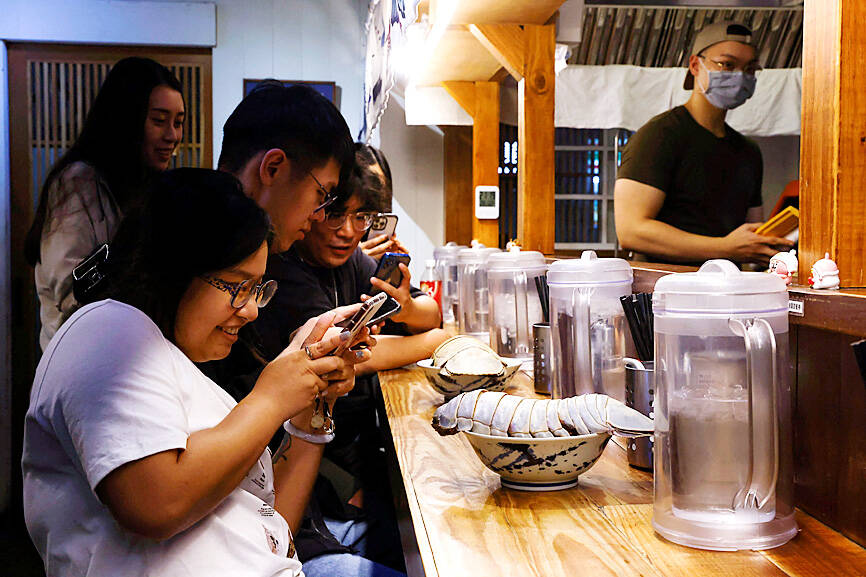A 14-legged giant isopod is the highlight of a new dish at a ramen restaurant in Taipei and it has people lining up — both for pictures and for a bite from this bowl of noodles.
Since “The Ramen Boy” launched the limited-edition noodle bowl on Monday last week, declaring in a social media post that it had “finally got this dream ingredient,” more than 100 people have joined a waiting list to dine at the restaurant.
“It is so attractive because of its appearance — it looks very cute,” said the 37-year-old owner of the restaurant, who wanted to be identified only as Hu, as he held up a giant isopod while customers took pictures.

Photo: Ann Wang, Reuters
“As for the cooking method, we use the simplest way, steam, so there is no difficulty to process it,” Hu said.
The restaurant steams the isopod for 10 minutes before adding it to the top of a bowl of ramen with thick chicken and fish broth. Each bowl costs NT$1,480 (US$48).
A customer said the meat tastes like a cross between crab and lobster, with a dense texture and some chewiness.
Giant isopods — a distant cousin of crabs and prawns — are the largest among the thousands of species in the crustacean group, NOAA Ocean Exploration says on its Web site.
They are usually found about 170m to 2,140m deep in the ocean, with 80 percent of them living at a depth of 365m to 730m, Taiwan’s Animal Planet said in a Facebook page.
A Taiwanese expert identified the species as Bathynomus jamesi, discovered near the Pratas Islands (Dongsha Islands, 東沙島) in the South China Sea. They are thought to be caught at between 300m to 500m.
Since the ramen launched, some academics have expressed concerns over the potential ecological impact of bottom trawling fishing tactics as well as possible health risks.
However, customers at the restaurant disagree.
“If it’s just a special menu, and the giant isopods were caught unintentionally like the restaurant owner says they were, everyone should try it if they get a chance,” said 34-year-old Digell Huang, who works as a genetic counselor.
“I am very honored to have this opportunity to taste it,” she added as she ate from a bowl of the isopod-topped noodles.
However, an academic warned against potential health risks, saying the largely unknown species might contain toxins or heavy metals such as mercury.
The Bathynomus jamesi species was recognized officially in Taiwan last year and there is not much data on it, said Huang Ming-chih (黃銘志), a biotechnology associate professor specializing in deep-sea invertebrates at the National University of Tainan.
“The best practice would be to do more research ... build a complete database and then allow people to eat, it would be better that way,” he added.

Trips for more than 100,000 international and domestic air travelers could be disrupted as China launches a military exercise around Taiwan today, Taiwan’s Civil Aviation Administration (CAA) said yesterday. The exercise could affect nearly 900 flights scheduled to enter the Taipei Flight Information Region (FIR) during the exercise window, it added. A notice issued by the Chinese Civil Aviation Administration showed there would be seven temporary zones around the Taiwan Strait which would be used for live-fire exercises, lasting from 8am to 6pm today. All aircraft are prohibited from entering during exercise, it says. Taipei FIR has 14 international air routes and

Taiwan lacks effective and cost-efficient armaments to intercept rockets, making the planned “T-Dome” interception system necessary, two experts said on Tuesday. The concerns were raised after China’s military fired two waves of rockets during live-fire drills around Taiwan on Tuesday, part of two-day exercises code-named “Justice Mission 2025.” The first wave involved 17 rockets launched at 9am from Pingtan in China’s Fujian Province, according to Lieutenant General Hsieh Jih-sheng (謝日升) of the Office of the Deputy Chief of the General Staff for Intelligence at the Ministry of National Defense. Those rockets landed 70 nautical miles (129.6km) northeast of Keelung without flying over Taiwan,

City buses in Taipei and New Taipei City, as well as the Taipei MRT, would on Saturday begin accepting QR code payments from five electronic payment providers, the Taipei Department of Transportation said yesterday. The new option would allow passengers to use the “transportation QR code” feature from EasyWallet, iPass Money, iCash Pay, Jkopay or PXPay Plus. Passengers should open their preferred electronic payment app, select the “transportation code” — not the regular payment code — unlock it, and scan the code at ticket readers or gates, General Planning Division Director-General Liu Kuo-chu (劉國著) said. People should move through the

The Ministry of National Defense (MND) today released images of the military tracking China’s People's Liberation Army (PLA) movements during the latest round of Chinese drills around Taiwan. The PLA began "Justice Mission 2025" drills today, carrying out live-fire drills, simulated strikes on land and maritime targets, and exercises to blockade the nation's main ports. The exercises are to continue tomorrow, with the PLA announcing sea and air space restrictions for five zones around Taiwan for 10 hours starting from 8:30am. The ministry today released images showing a Chinese J-16 fighter jet tracked by a F-16V Block 20 jet and the